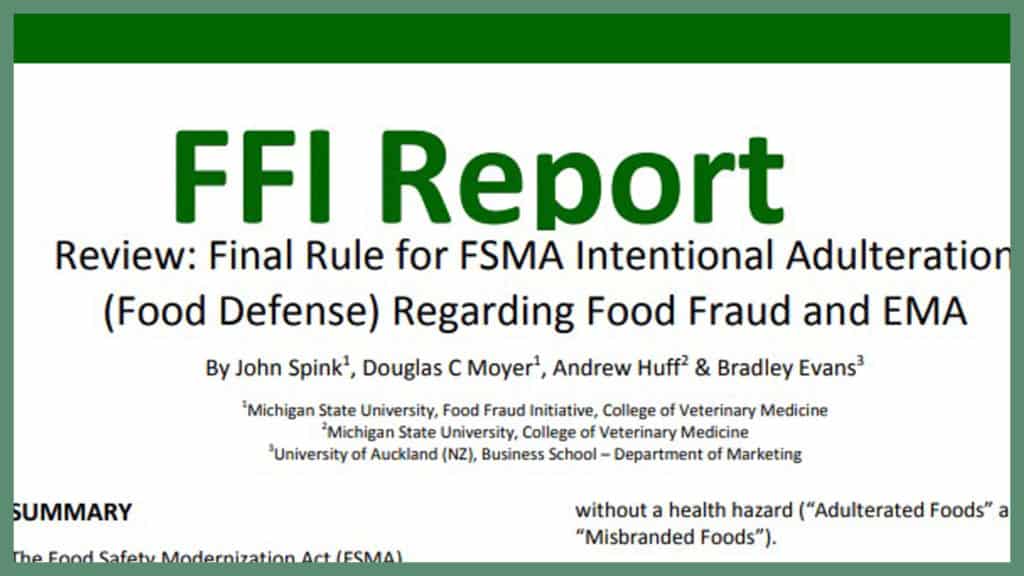This is a detailed, 22-page review of the Food Fraud aspects or requirements of the recently published Food Safety Modernization Act Intentional Adulteration (Food Defense) Final Rule (FSMA-IA). While there are no new Food Fraud requirements, there are tremendous insights on related FSMA compliance.
This Intentional Adulteration Final Rule is the seventh and last that will be published by FDA.
Yesterday FDA conducted their second public meeting (May 26, 2016 and June 21, 2016) to present and clarify the FSMA-IA requirements. The Appendix of our full report includes a summary of both of those meetings.
Overall:
- For Food Fraud compliance (required in September 2017):
- it appears that current broad Food Fraud Vulnerability Assessment and Food Fraud Prevention Plan activities will lead to compliance with FSMA‐PC.
- For Food Defense compliance (required in at least three years in May 2019):
- assess how (and if) the FDA requirements will change from current programs, wait for more details on what is a ‘significant vulnerability’ that must be mitigated, also seek clarity on what is a ‘credible threat’ that would trigger a re-evaluation of the Food Defense plan.
From our report, Final Rule for FSMA Intentional Adulteration (Food Defense) Regarding Food Fraud and EMA (https://blog.foodfraudpreventionthinktank.com/wp-content/uploads/2021/02/FFIR-FSMA-IA-FSMAIA-v22-formatted-clean-FFPTT-v3.pdf) :
SUMMARY
The Food Safety Modernization Act (FSMA) Intentional Adulteration Rule (FSMA-IA) draft was published in December 2013, public meetings started in February 2014 and the final rule was published May 27, 2016. The effective date is in 60 days but “[FDA] are providing for a longer timeline for facilities to come into compliance” in at least three years, or May 2019.
Economically Motivated Adulteration (EMA) – and Food Fraud (FF) – is in the FSMA law due to the text “…intentional adulteration, including acts of terrorism.” FDA announced their scope narrowed to “wide scale [human] public health harms” and removed from this rule the concepts of EMA, disgruntled employees, tampering, etc. The FSMA compliance requirements for FF & EMA are in the Preventive Controls Rule (FSMA-PC).
FSMA-IA also continually confirms many times that the Food, Drug & Cosmetics Act (FDCA) is still in effect, which includes all types of Food Fraud, even without a health hazard (“Adulterated Foods” and “Misbranded Foods”).
CONCLUSION
Even though Food Fraud (FF) and Economically Motivated Adulteration (EMA) are not a compliance requirement for FSMA-IA, this final rule provides important insight into FSMA and assessments:
- Addressing all types of Food Fraud is a requirement – and subject to a recall – under the Food, Drug & Cosmetics Act (FDCA).
- FDA specifically reiterated the FDCA compliance requirement in sections on “Adulterated Foods” and “Misbranded Foods.”
- FSMA-IA stated that stolen goods (various types of theft) that lead to a public health hazard are clearly defined and expected to be covered under FSMA-PC.
- There were no more clarifications of key terms such as reasonably foreseeable hazard, significant vulnerability, rare occurrence, credible threat, or the threshold of acceptable or unacceptable.
The compliance requirement for Food Fraud is addressed in FSMA-PC, not in this FSMA-IA. Other FSMA final rules provide some insight on FDA’s thinking regarding assessments, thresholds of acceptable /unacceptable, and the compliance priorities (see appendix of full report regarding the May 26, 2016 FDA public call).
Reviewing FSMA compliance is exhausting. There are seven long Final Rules that impact all aspects of a food company. There are minute details that can lead to a recall or regulatory penalties. We have focused on the Food Fraud aspects – and tried to provide as brief and concise insight as possible – so hopefully this one part of FSMA you can quickly address. We have been continually adjusting our research focus to provide academic theory, in the form of scholarly publications, to support your countermeasures and control systems. There are many resources that are available for assisting your FSMA compliance. Find trusted resources and rely on them. FFI

